Lonescale Alternatives
This guide offers a direct comparison of 10 Lonescale alternatives, focusing on features and pricing to inform your decision.

Lonescale performs well for specific tasks. Many teams use it to find sales triggers, track job changes, and identify hiring signals. If you need that kind of targeted intelligence, it's a solid tool that gets the job done.
But no tool does everything. Some users find its focus can be narrow, which leads them to search for alternatives. We've analyzed the top options against Lonescale to help you shortlist the best fit for your team. Let's get started.
11x: A Digital Worker for Your Sales Team
For teams interested in digital workers for sales, consider 11x. It provides autonomous agents that execute specific sales functions. This approach can augment your current processes with dedicated digital support for your sales operations.
11x is a go-to-market platform that uses AI agents to manage sales functions. An agent named Alice finds prospects, handles outreach via email and LinkedIn, and maintains the CRM. Another agent, Julian, qualifies inbound leads and books meetings.
This approach combines tools for data enrichment, outreach, and email warmup. As a result, teams may not need separate point solutions for these tasks, as 11x provides them within one platform.
Lonescale Alternatives
The following section provides a detailed breakdown of each Lonescale alternative. We analyze pricing, core features, and the specific advantages and disadvantages of each tool when compared to Lonescale.
1) ZoomInfo SalesOS
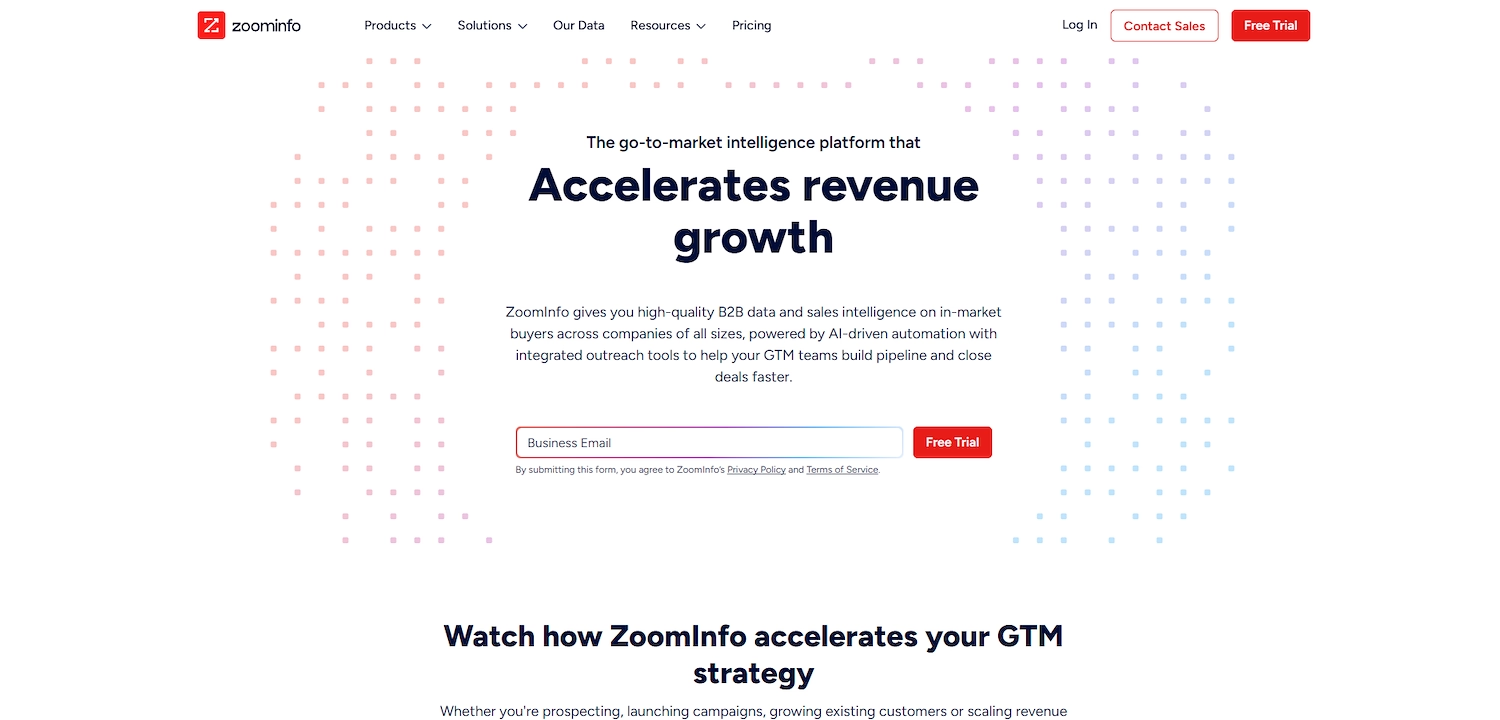
ZoomInfo SalesOS is a go-to-market intelligence platform with contact and company data for B2B teams. It helps users identify and connect with buyers through buyer-intent signals, which show when a prospect is ready to purchase. The platform unifies data and engagement tools into one system.
It supports sales, marketing, and recruitment. For talent acquisition, it provides updated contact information to source candidates, which can signal hiring activity.
ZoomInfo SalesOS's Main Features
- Identifies anonymous website visitors and turns page views into potential pipeline.
- Analyzes call and meeting interactions for insights using its conversation intelligence tool.
- Automates go-to-market activities by triggering workflows based on real-time data.
- Provides a generative AI companion, Copilot, to surface insights and draft sales outreach.
ZoomInfo SalesOS: How It Compares to Lonescale
Average Review Score: 4.5/5 stars based on 8,738 G2 reviews.
- ZoomInfo SalesOS provides a more extensive database for broad market research, unlike Lonescale's specific focus on hiring and sales triggers.
- It includes an AI companion, Copilot, that drafts outreach and surfaces insights, a function not present in Lonescale, which centers on raw data signals.
- The platform integrates sales engagement and conversation intelligence, whereas Lonescale requires separate tools for outreach and call analysis.
- This tool identifies anonymous website visitors to generate leads from web traffic, a source of intelligence different from Lonescale's external signals.
Where Lonescale Has an Edge Over ZoomInfo
- Lonescale provides highly specific alerts for job changes and new hires. In comparison, ZoomInfo's intent data is broader and may require users to filter more to find similar targeted triggers.
- The platform's wide range of features can lead to a higher price. Teams that only need targeted hiring intelligence, like what Lonescale offers, might find the cost of ZoomInfo high for their use case.
- Some users note that due to its large database, contact details in ZoomInfo can sometimes be outdated. Lonescale's narrow focus on job movement may provide more timely data for that specific purpose.
Pricing and Cost-Effectiveness
ZoomInfo does not publish its pricing; it provides custom plans based on team size and needs. The platform's extensive features mean it is generally a higher-priced option than Lonescale, which offers a more cost-effective solution for teams that only need its specific job-change intelligence.
2) Apollo.io
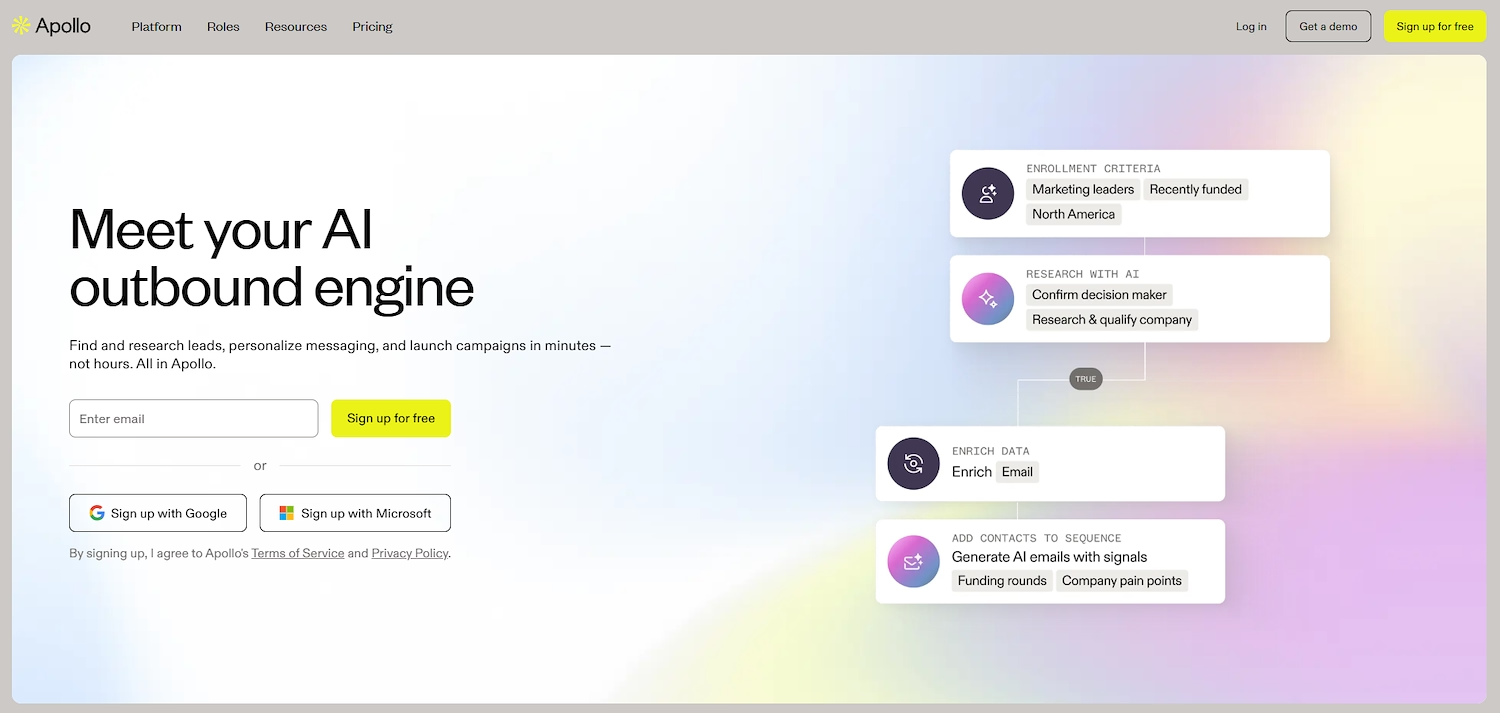
Apollo.io is a sales intelligence platform with a database of contacts and companies. It provides tools for outreach and analytics to help teams find and engage with potential customers.
The platform offers data on sales triggers, such as job changes and hiring signals. This information helps sales teams identify opportune moments to connect with prospects and build pipeline.
Apollo.io's Main Features
- Maintains a database of contacts and companies for prospecting.
- Provides tools for outreach to find and engage with potential customers.
- Offers analytics to help teams measure the performance of their outreach.
Apollo.io: How It Compares to Lonescale
Average Review Score: 4.7/5 stars based on 8,904 G2 reviews.
- Apollo.io combines a contact database with a sales engagement suite in one platform. This differs from Lonescale, which provides intelligence but requires separate tools for outreach.
- The platform offers a broad database of over 210 million contacts for general prospecting. This provides a wider reach than Lonescale's specific focus on job-change and hiring signals.
- It includes analytics tools to measure the performance of outreach campaigns. Lonescale provides the initial trigger but does not offer native tools to track the results of acting on that signal.
- The availability of a free plan makes the platform accessible for individuals or small teams. This offers a cost-effective entry point not typically found with Lonescale.
Where Lonescale Has an Edge Over Apollo.io
- Apollo.io provides job change data as one feature within its large platform. In contrast, Lonescale specializes only in these signals, which can result in more targeted alerts without the need to filter through broader datasets.
- Some users find that due to its large database, contact details in Apollo.io can sometimes be out of date. Lonescale's narrow focus on recent job movements may offer more timely data for that specific purpose.
- The platform includes a full suite of engagement and analytics tools. For teams that only need job change intelligence, Lonescale offers a simpler solution without the extra components of an all-in-one platform.
Pricing and Cost-Effectiveness
Apollo.io offers a free plan and paid tiers starting at $49 per user per month, making it accessible for various team sizes. Lonescale does not publish its pricing, suggesting a custom model that can be more cost-effective for teams needing only its specialized job-change intelligence.
3) Clearbit
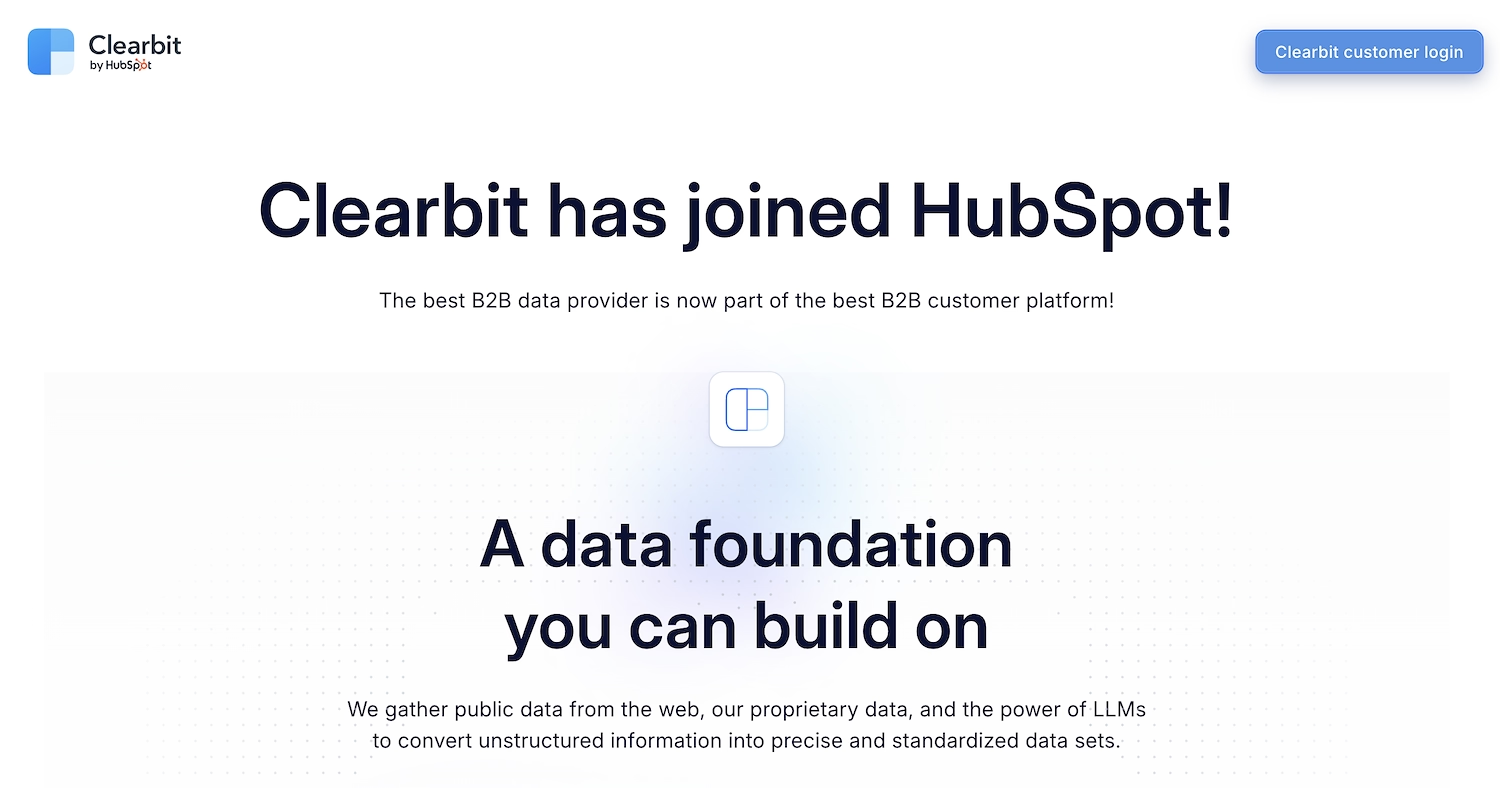
Clearbit, now part of HubSpot, is a B2B data provider. It uses public and proprietary data to enrich company and contact records. The service provides the data foundation for sales and marketing initiatives inside HubSpot.
The platform supports real-time lead qualification and routing. It also identifies anonymous website visitors that signal buying intent. This allows teams to prioritize outreach to active, qualified accounts.
Clearbit's Main Features
- Enriches lead, contact, and account records with firmographic and demographic details from multiple data sources.
- Identifies anonymous website visitors that match an ideal customer profile and displays them in a visitor dashboard.
- Scores and routes leads in real time using data points like 6-digit NAICS codes and corporate hierarchy.
- Removes form fields that it can enrich automatically, which reduces friction and can boost conversion rates.
Clearbit: How It Compares to Lonescale
Average Review Score: 4.4/5 stars based on 626 G2 reviews.
- Clearbit enriches existing lead and contact records with over 100 data points. This differs from Lonescale, which provides new signals like job changes instead of augmenting existing data.
- It identifies anonymous companies that visit your website, creating leads from your web traffic. Lonescale, in comparison, finds leads from external hiring and job change signals.
- The platform scores and routes leads in real time using enriched data. This automates a workflow step that is not native to Lonescale, which only provides the initial trigger.
- This tool shortens website forms by auto-filling known information to help increase lead conversions, a feature outside the scope of Lonescale's data-only service.
Where Lonescale Has an Edge Over Clearbit
- Clearbit's main function is to enrich existing company and contact records. It does not specialize in job change alerts, which is the core data that Lonescale provides.
- The tool offers a wide set of data enrichment features inside HubSpot. Teams that only need job change signals might find Lonescale to be a more straightforward solution for their specific purpose.
- Lonescale provides alerts based on individual career moves, which can signal a timely opportunity for outreach. Clearbit's intent data, in contrast, often relates to account-level interest based on website visits.
Pricing and Cost-Effectiveness
Clearbit provides custom pricing and is generally a higher-cost option due to its broad data enrichment features. Lonescale is more cost-effective for teams that only need its specific job-change intelligence. For the most accurate information, visit Clearbit's official website.
4) Cognism
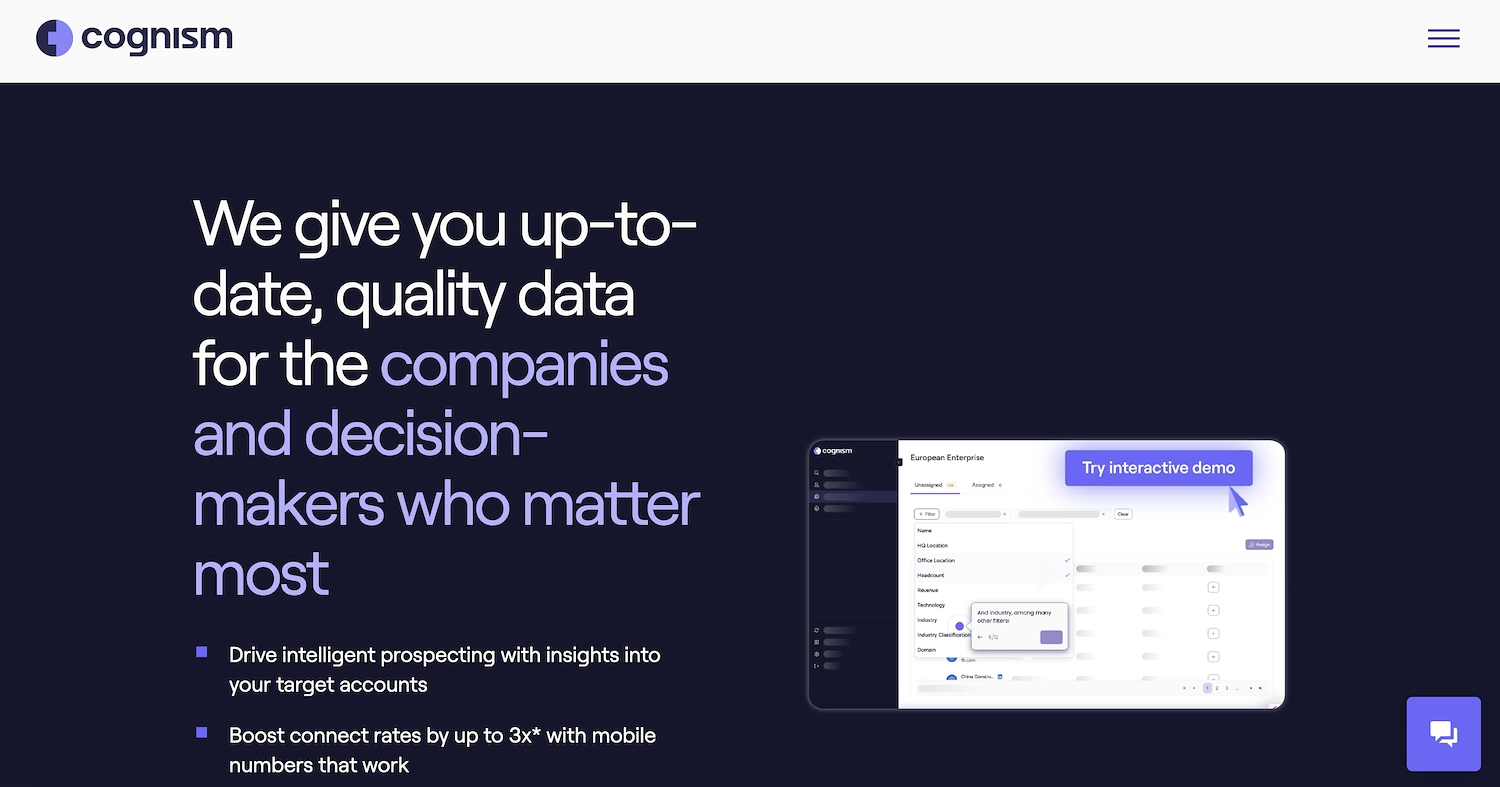
Cognism is a sales intelligence platform that provides an international database of B2B contact and company information. It helps sales teams with outreach through access to verified mobile numbers and business emails.
The platform identifies sales triggers like job changes and hiring signals. This data helps teams discover timely opportunities to connect with new prospects and build pipeline.
Cognism's Main Features
- Provides phone-verified mobile numbers, called Diamond Data®, that are human-checked to increase connect rates.
- Offers extensive coverage of mobile numbers and email addresses for contacts in the UK and EMEA regions.
- Maintains a database of senior-level decision-makers, screened against Do-Not-Call lists for compliant outreach.
- Includes a browser extension, Sales Companion, to prospect directly from LinkedIn and corporate websites.
Cognism: How It Compares to Lonescale
Average Review Score: 4.6/5 stars based on 1,033 G2 reviews.
- Cognism provides phone-verified mobile numbers, known as Diamond Data®, to help increase connect rates. Lonescale provides the hiring signal but does not include verified contact details for outreach.
- It offers strong data coverage for contacts in the UK and EMEA regions. This is different from Lonescale, which focuses on job-change signals without a specific regional data strength.
- The platform integrates with CRMs like Salesforce and HubSpot to enrich existing records. In comparison, Lonescale delivers signals that teams must manually add to their CRM.
- Its browser extension allows users to find contact data directly on LinkedIn or company websites. Lonescale provides alerts but does not offer a tool for real-time prospecting on web pages.
Where Lonescale Has an Edge Over Cognism
- Lonescale specializes in job-change signals, offering highly targeted alerts. Cognism includes these signals within a broader platform, so users may need to filter more to find specific triggers.
- The platform includes a full suite of engagement tools. For teams that only need job change intelligence, Lonescale offers a simpler solution without the extra components and potential cost of an all-in-one platform.
- Some teams may find Cognism's focus on providing verified contact data redundant if they already use other outreach tools. Lonescale provides only the raw job-change signal, which integrates into any existing sales stack.
Pricing and Cost-Effectiveness
Cognism provides custom pricing based on team needs, and user reviews suggest it is a higher-cost option. Lonescale is more cost-effective for teams that only need its specialized job-change intelligence. For the most accurate pricing, visit Cognism's official website.
5) Seamless.AI
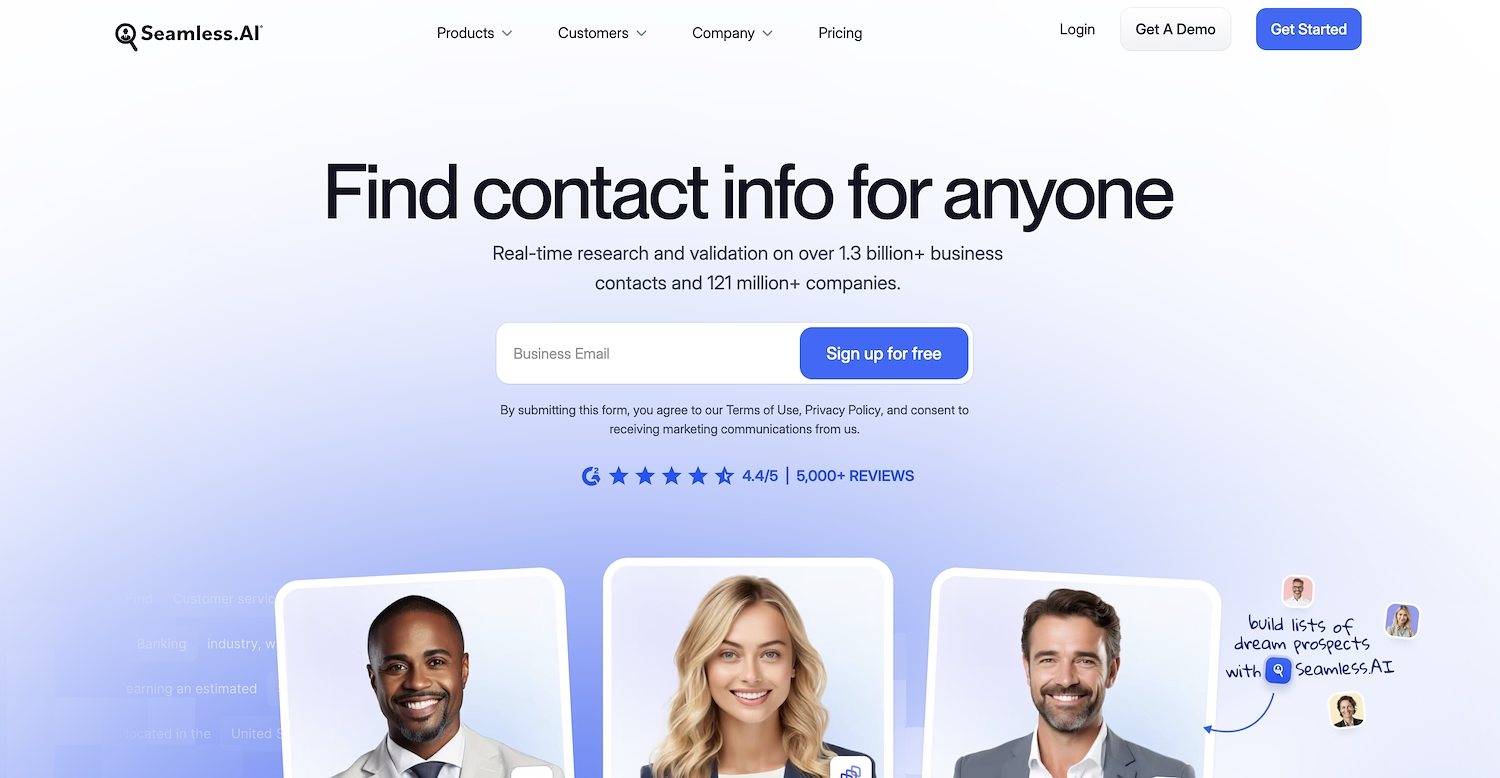
Seamless.AI is a real-time search engine for B2B data that helps sales teams find verified contacts. The platform identifies sales triggers like job changes and new hires, which signal timely opportunities for outreach and help teams connect with prospects at the right moment.
Seamless.AI's Main Features
- Generates research and personalized messages using AI for pitch intelligence.
- Surfaces prospects who are ready to buy using buyer intent data.
- Enriches incomplete records by turning an email, phone number, or domain into a full profile.
- Automates list-building to maintain a full sales pipeline with its Autopilot feature.
Seamless.AI: How It Compares to Lonescale
Average Review Score: 4.4/5 stars based on 5,067 G2 reviews.
- Seamless.AI provides AI-powered pitch intelligence to help write personalized messages. Lonescale, in comparison, offers the raw data signal without tools for content creation.
- It enriches partial records into full contact profiles. This function differs from Lonescale, which focuses on generating new leads from job changes instead of augmenting existing contact data.
- The tool includes an Autopilot feature that automates list-building. This provides a different workflow from Lonescale, which delivers individual alerts that teams usually manage manually.
- This platform operates as a real-time search engine for B2B contacts. This allows for active prospecting, a different approach from Lonescale's system of sending alerts based on job changes.
Where Lonescale Has an Edge Over Seamless.AI
- Seamless.AI includes job change data as one part of a large B2B search engine. Lonescale, by comparison, specializes only in these signals, which may provide more targeted alerts for teams that do not need to filter through a broad dataset.
- Because Seamless.AI covers a vast amount of B2B data, some users find that contact information can sometimes be inaccurate. A tool like Lonescale, with its specific focus on job changes, may provide more current data for that single use case.
- This tool offers a complete suite of features, including AI for writing messages. Teams that only require job change intelligence might find Lonescale offers a more direct solution that integrates into their existing sales tools without adding redundant features.
Pricing and Cost-Effectiveness
Seamless.AI provides custom pricing and is generally considered a higher-cost option. Lonescale is more cost-effective for teams that only need its specialized job-change intelligence. For the most accurate pricing, visit Seamless.AI's official website.
Add a Digital Worker With 11x
If your team is exploring digital workers, 11x offers a practical solution. Its AI agents manage specific sales functions to support your existing operations. Consider 11x to add dedicated digital assistance to your sales process.
With 11x, we run your sales playbook using AI. Our agent Alice finds accounts, enriches their data, and manages outreach. Julian qualifies inbound leads and books meetings. The platform combines data, outreach, and email warmup, replacing several tools in a typical GTM stack.
Book a demo to see 11x in action.
6) Lusha
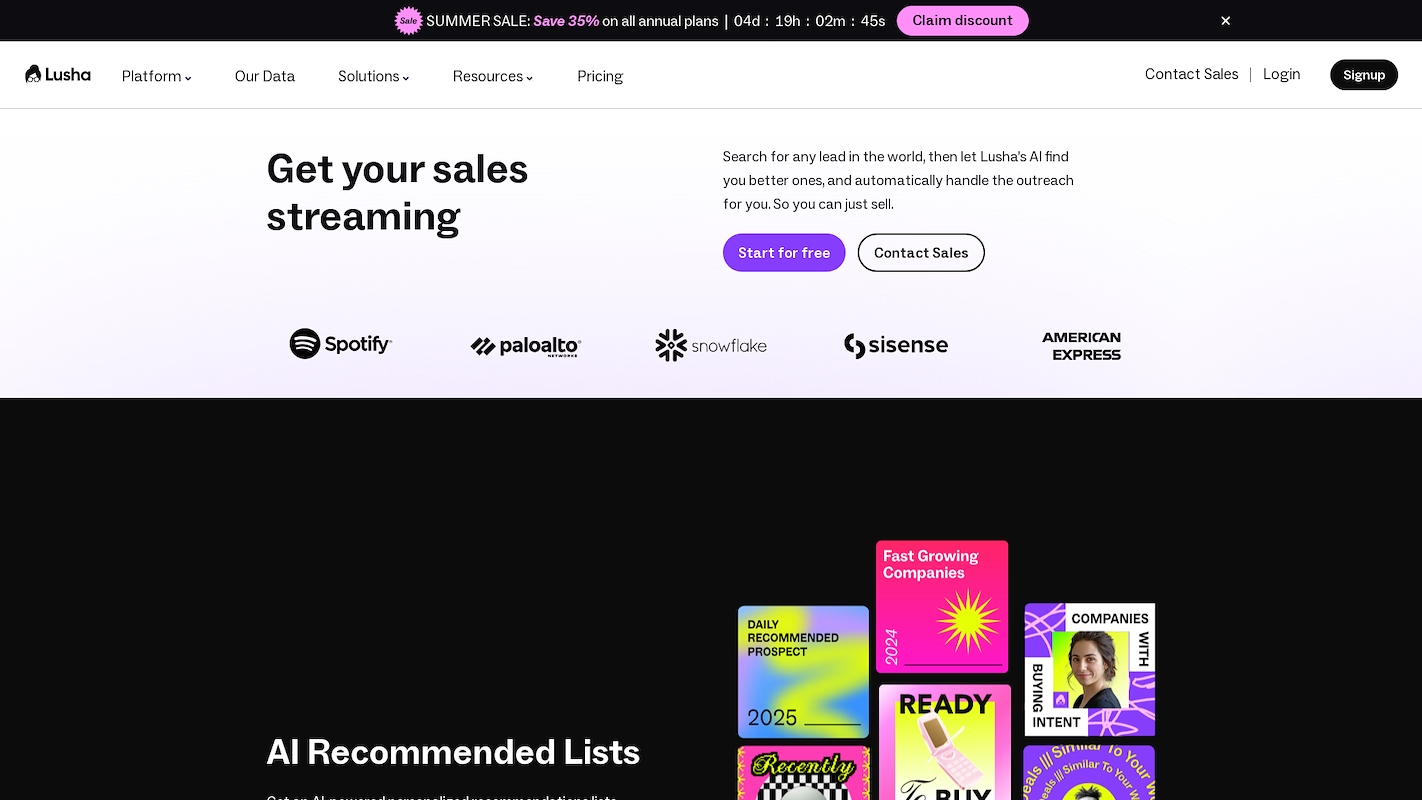
Lusha is a sales intelligence platform with a database of B2B contact and company information. It provides sales teams with data to find and connect with prospects. The platform identifies sales triggers like job changes and hiring signals, which can indicate timely opportunities for outreach.
Lusha's Main Features
- Provides daily lists of companies and decision-makers based on a user's ideal customer profile.
- Automates personalized email sequences with copy generated by its AI.
- Records and analyzes sales meetings for performance insights.
- Captures contact information from LinkedIn and company websites using a browser extension.
Lusha: How It Compares to Lonescale
Average Review Score: 4.3/5 stars based on 1,516 G2 reviews.
- Lusha uses AI Prospect Playlists to automatically build and refresh lead lists. This is different from Lonescale, which sends individual alerts that teams must manually compile.
- The platform includes an AI feature to generate personalized email copy. In contrast, Lonescale provides the initial trigger but does not offer tools to help write the outreach message.
- It offers a tool to record and analyze sales meetings for performance insights. Lonescale focuses only on the pre-outreach signal and lacks post-engagement analytics.
- This tool provides a free plan and transparent paid tiers, which makes it accessible for individuals. Lonescale's custom pricing is often better for teams that need only its specific intelligence.
Where Lonescale Has an Edge Over Lusha
- Lusha includes job change data within a broad sales intelligence platform. Lonescale specializes only in these signals, which may provide more focused alerts for teams that do not need to sort through a general dataset.
- The platform offers a full suite of engagement tools, such as an AI email writer. For teams that only need job change intelligence, Lonescale provides a simpler solution without the extra components of an all-in-one platform.
- It automates parts of the sales process with its own tools. In comparison, Lonescale provides only the raw job-change signal, which offers more flexibility for teams that prefer to use their own established engagement workflows.
Pricing and Cost-Effectiveness
Lusha offers a free plan and paid tiers starting at $36 per user per month, making it accessible for individuals. Lonescale uses custom pricing, which can be more cost-effective for teams that only need its specialized job-change intelligence. For detailed pricing, visit Lusha's official website.
7) SalesIntel
SalesIntel is a B2B data platform that provides human-verified contact and company information. It helps sales and marketing teams find and connect with prospects. The platform also identifies sales triggers, including hiring signals, to help teams find timely opportunities for outreach.
SalesIntel's Main Features
- Provides human-verified contact and company data, re-verified every 90 days.
- Offers buyer intent data to identify companies actively researching solutions.
- Includes technographic data to show the technology stack of target accounts.
- Supplies firmographic data for detailed account segmentation and targeting.
SalesIntel: How It Compares to Lonescale
Average Review Score: 4.5/5 stars based on 261 G2 reviews.
- SalesIntel provides human-verified data, which can increase data accuracy. Lonescale focuses on delivering the job-change signal itself, not necessarily the verified contact details.
- It offers intent and technographic data, giving a broader view of an account. This differs from Lonescale's specific focus on hiring and job-change triggers.
- The platform includes a research-on-demand service where its team finds specific data for users. Lonescale provides automated alerts without a manual research component.
- This tool functions as a comprehensive data provider for general prospecting. Lonescale is a more specialized tool for identifying a single type of sales trigger.
Where Lonescale Has an Edge Over SalesIntel
- Lonescale specializes only in job-change and hiring signals. This can provide more focused alerts for teams that do not need the broader data sets offered by SalesIntel.
- The platform's focus on a single data type makes it a simpler tool to implement and use. Teams that only need this specific intelligence may find SalesIntel's features excessive for their needs.
- SalesIntel's human verification process, while ensuring accuracy, may introduce a time lag. Lonescale's automated system is designed to deliver job-change signals as they happen.
Pricing and Cost-Effectiveness
SalesIntel does not publish its pricing, offering custom plans based on data needs. Its features suggest it is a higher-cost option than Lonescale. For accurate pricing, visit SalesIntel's official website.
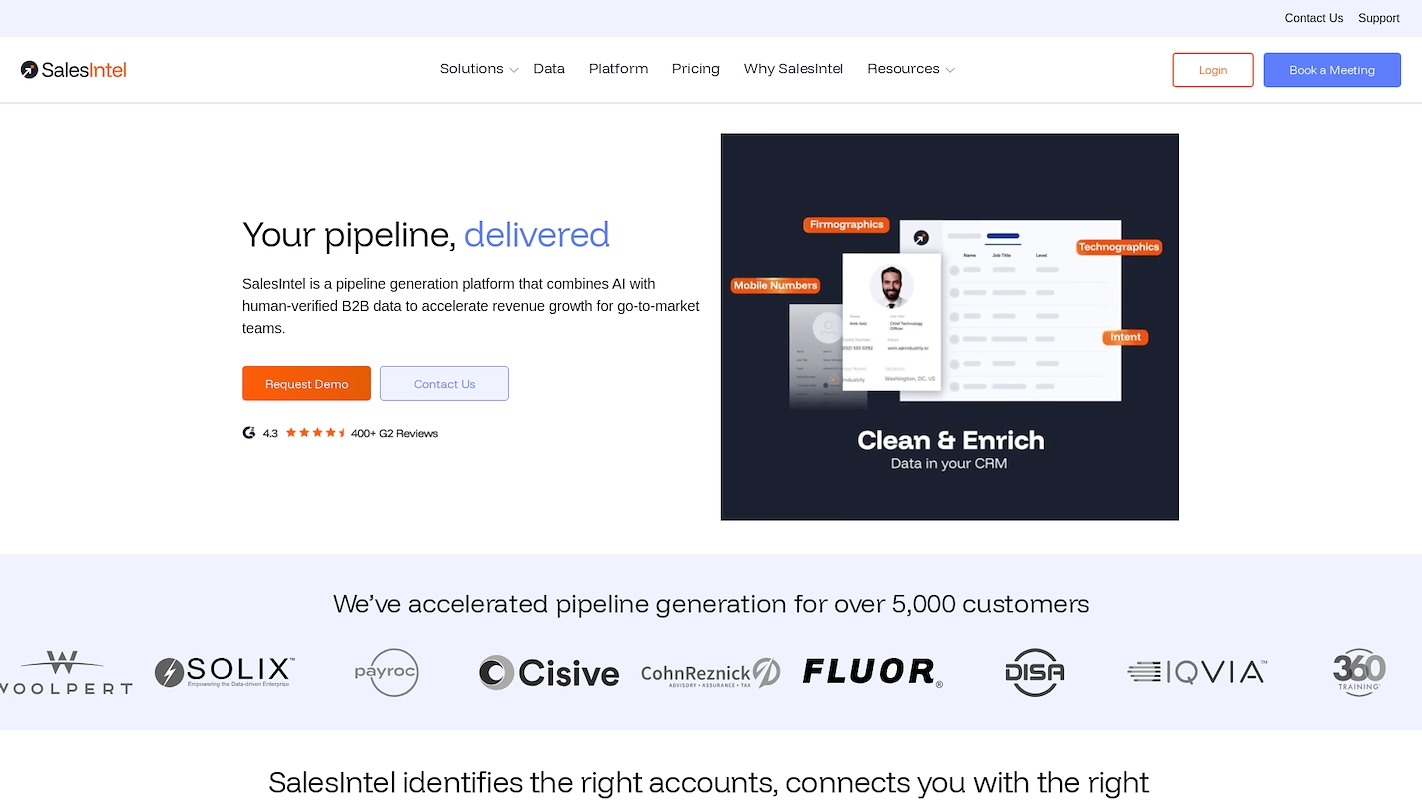
SalesIntel is a B2B data platform with human-verified contact and company information. It provides sales triggers, such as job changes and hiring signals, to sales and marketing teams. The platform also offers buyer intent, technographic, and firmographic data to build detailed account profiles.
SalesIntel's Main Features
- Provides human-verified data with 95% accuracy and offers a research-on-demand service.
- Identifies anonymous website visitors in real time with its VisitorIntel feature.
- Builds an evidence-based ideal customer profile to prioritize accounts with its ICPIntel tool.
- Automates signal monitoring and task routing using agentic workflows.
SalesIntel: How It Compares to Lonescale
Average Review Score: 4.3/5 stars based on 462 G2 reviews.
- SalesIntel provides human-verified data that its team re-verifies every 90 days for accuracy. In comparison, Lonescale focuses on the job-change signal itself, not the verification of contact details.
- It offers buyer intent and technographic data, which gives a more complete view of a target account. Lonescale specializes only in signals related to job changes and hiring.
- The platform includes a research-on-demand service, allowing users to request specific data from a human team. Lonescale operates as an automated system and does not have this manual service.
- This tool identifies anonymous companies that visit your website, creating leads from your web traffic. This is a different approach from Lonescale, which finds leads from external hiring signals.
Where Lonescale Has an Edge Over SalesIntel
- Lonescale provides a raw data signal for job changes, which offers flexibility. Teams can integrate this signal into any pre-existing sales engagement tool or workflow they already use.
- Some teams may find SalesIntel's pricing model includes features they do not need, such as technographics. Lonescale's focus on a single data type can result in a more cost-effective plan for this specific use case.
- The platform provides multiple types of signals, including buyer intent and technology usage. This might create noise for users who only want to track job changes, a specific trigger that Lonescale delivers with high focus.
Pricing and Cost-Effectiveness
SalesIntel provides custom pricing based on data needs and offers a free trial. Its comprehensive features suggest it is a higher-cost option, while Lonescale is more cost-effective for teams that only need its specialized job-change intelligence. For accurate pricing, visit SalesIntel's official website.
8) LeadIQ
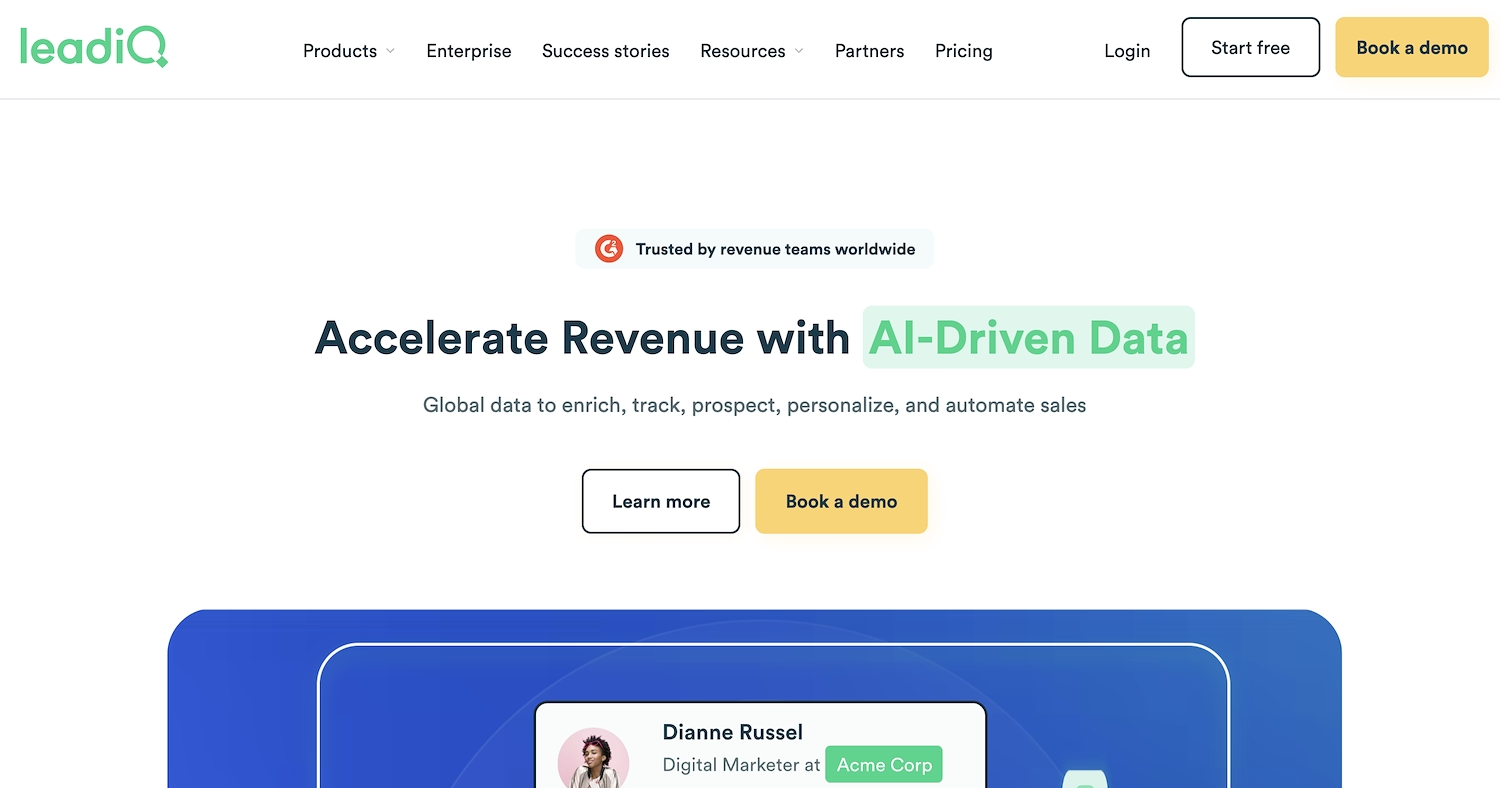
LeadIQ is a sales intelligence platform with a database of B2B contact and company information. It helps sales teams find and connect with prospects. The platform also tracks sales triggers, including job changes and hiring signals, to show teams timely moments for outreach.
LeadIQ's Main Features
- Finds prospect data and builds lead lists for outreach.
- Personalizes cold outreach using its AI-powered Scribe feature.
- Integrates with CRMs like Salesforce and sales engagement platforms.
- Captures contact information from LinkedIn and company websites.
LeadIQ: How It Compares to Lonescale
Average Review Score: 4.2/5 stars based on 1,097 G2 reviews.
- LeadIQ includes an AI feature, Scribe, to help write personalized outreach. This differs from Lonescale, which provides the job-change signal without tools for message creation.
- It integrates directly with CRMs and sales engagement platforms like Salesforce. This is different from Lonescale, where teams must manually import the raw signals into their systems.
- This tool provides a free plan and transparent pricing tiers, which makes it accessible for individuals. Lonescale, in contrast, uses a custom pricing model better suited for team-wide needs.
- Its browser extension captures contact information directly from LinkedIn and company websites. Lonescale sends alerts about job changes but lacks a tool for real-time prospecting on web pages.
Where Lonescale Has an Edge Over LeadIQ
- LeadIQ provides job change data as one feature within a broad platform. In contrast, Lonescale specializes only in these signals, which can result in more focused alerts without the need to filter through a general dataset.
- Some users find that because the platform covers a vast amount of data, contact information can sometimes be inaccurate. A tool like Lonescale, with its specific focus, may provide more current data for that single use case.
- This tool offers a complete suite of features, including an AI for writing messages. Teams that only require job change intelligence might find Lonescale offers a more direct solution that integrates into their existing sales tools.
Pricing and Cost-Effectiveness
LeadIQ offers a free plan and paid tiers starting at $45 per user per month, making it accessible for individuals. Lonescale uses custom pricing, which can be more cost-effective for teams that only need its specialized job-change intelligence. For detailed pricing, visit LeadIQ's official website.
9) Lead411
Lead411 is a B2B data platform that provides contact and company information. It helps sales teams find prospects with sales triggers, including job changes and hiring signals. This data shows timely moments for outreach.
Lead411's Main Features
- Provides a database of verified B2B contact and company data.
- Offers buyer intent data to identify companies actively researching solutions.
- Includes a browser extension to capture contact information from websites.
- Supports outreach with built-in email and SMS capabilities.
Lead411: How It Compares to Lonescale
Average Review Score: 4.5/5 stars based on 831 G2 reviews.
- Lead411 provides buyer intent data, which gives a broader view of prospect activity. Lonescale focuses only on job-change and hiring signals.
- It includes built-in tools for email and SMS outreach. In contrast, Lonescale provides the signal but requires separate tools for engagement.
- The platform offers a free trial and transparent pricing plans. This makes it accessible for individuals, unlike Lonescale's custom team-based model.
- Its browser extension allows for real-time prospecting on websites. Lonescale sends alerts but does not have a live capture tool.
Where Lonescale Has an Edge Over Lead411
- Lonescale specializes only in job-change signals, which can provide more focused alerts. Lead411 includes these signals within a broader platform that may require more filtering.
- For teams that only need job change intelligence, Lonescale offers a simpler solution. It avoids the extra components of an all-in-one platform like Lead411.
- Some users note that data in large databases can occasionally be outdated. Lonescale's narrow focus on recent job moves may offer more timely data for that specific purpose.
Pricing and Cost-Effectiveness
Lead411 offers a free trial and paid plans starting at $99 per month. Lonescale uses custom pricing, which can be more cost-effective for teams that only need its specialized job-change intelligence. For details, visit Lead411's official website.
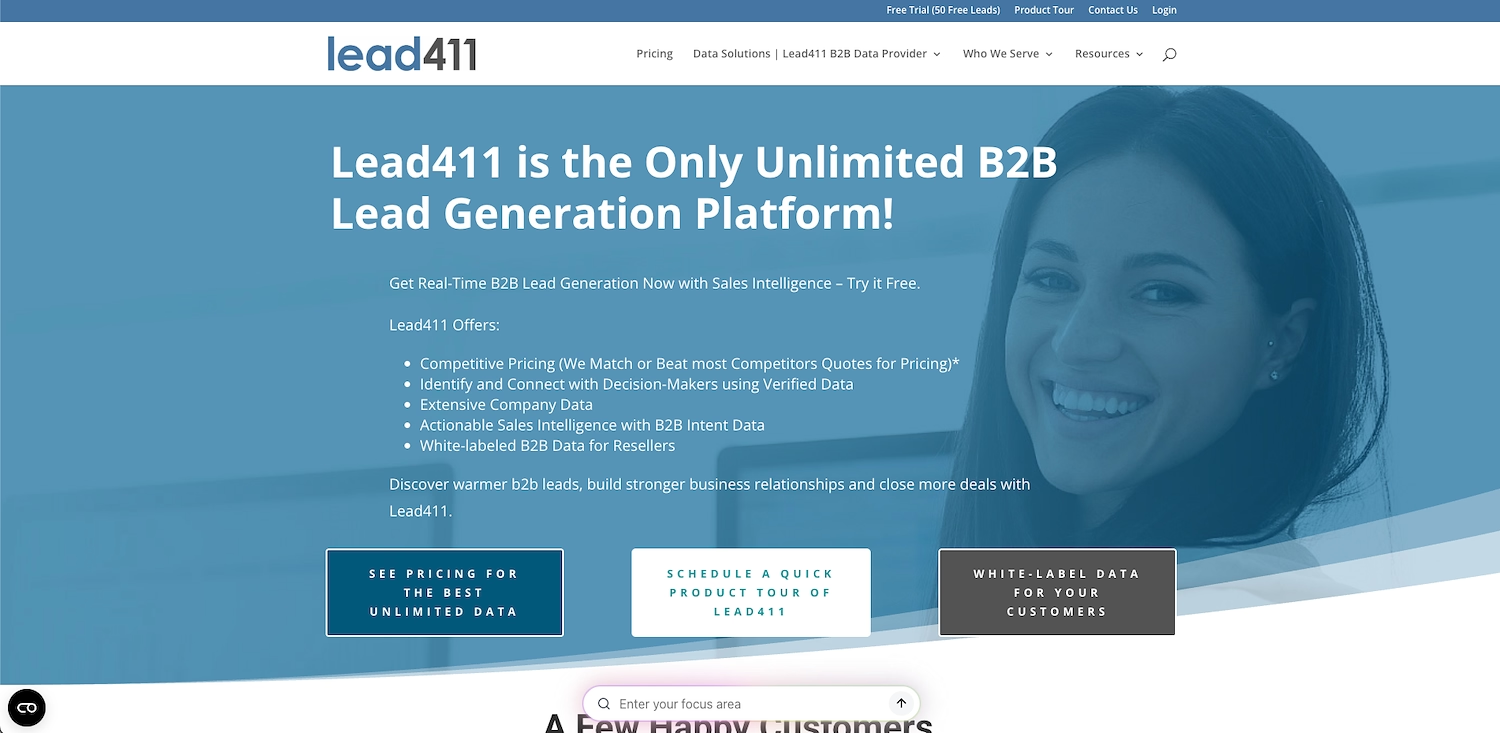
Lead411 is a B2B data platform with contact and company information. It helps sales teams find prospects with sales triggers like job changes and hiring signals. The platform also offers buyer intent data to identify companies that actively search for solutions.
Lead411's Main Features
- Offers a built-in email automation feature to set up and run outreach campaigns.
- Provides buyer intent data from Bombora to identify companies researching relevant topics.
- Includes growth intent signals like recent funding, new company locations, and IPO announcements.
- Features an A.I. dashboard that automatically tracks key lead indicators.
Lead411: How It Compares to Lonescale
Average Review Score: 4.5/5 stars based on 466 G2 reviews.
- Lead411 provides buyer intent data from Bombora, which shows companies actively researching solutions. This offers a broader view of prospect interest compared to Lonescale's focus on job-change signals.
- The platform includes a built-in email automation feature for outreach campaigns. This is different from Lonescale, which provides the raw signal and requires a separate tool for engagement.
- It offers growth intent signals, such as recent funding or IPO announcements. This adds another layer of intelligence beyond the hiring and job-change triggers that Lonescale provides.
- An A.I. dashboard automatically tracks and presents key lead indicators. This offers a centralized view of opportunities, whereas Lonescale delivers individual alerts that teams must manage themselves.
Where Lonescale Has An Edge Over Lead411
- Lead411 provides many signal types, such as funding news and buyer intent. For teams that only need job-change alerts, Lonescale offers a more focused solution that may require less filtering to find relevant opportunities.
- The platform has built-in email automation. In contrast, Lonescale delivers only the raw data signal. This approach gives teams with their own sales tools more flexibility and avoids overlap with features they already use.
- Because Lead411 covers a large amount of data, some users find that contact details can sometimes be out of date. A tool like Lonescale, with its narrow focus on job movement, may offer more current data for that specific purpose.
Pricing and Cost-Effectiveness
Lead411's basic annual plan starts at $75 per user per month, providing a transparent pricing model. Lonescale uses custom pricing, which can be more cost-effective for teams that only need its specialized job-change intelligence. For detailed pricing, visit Lead411's official website.
10) Crunchbase
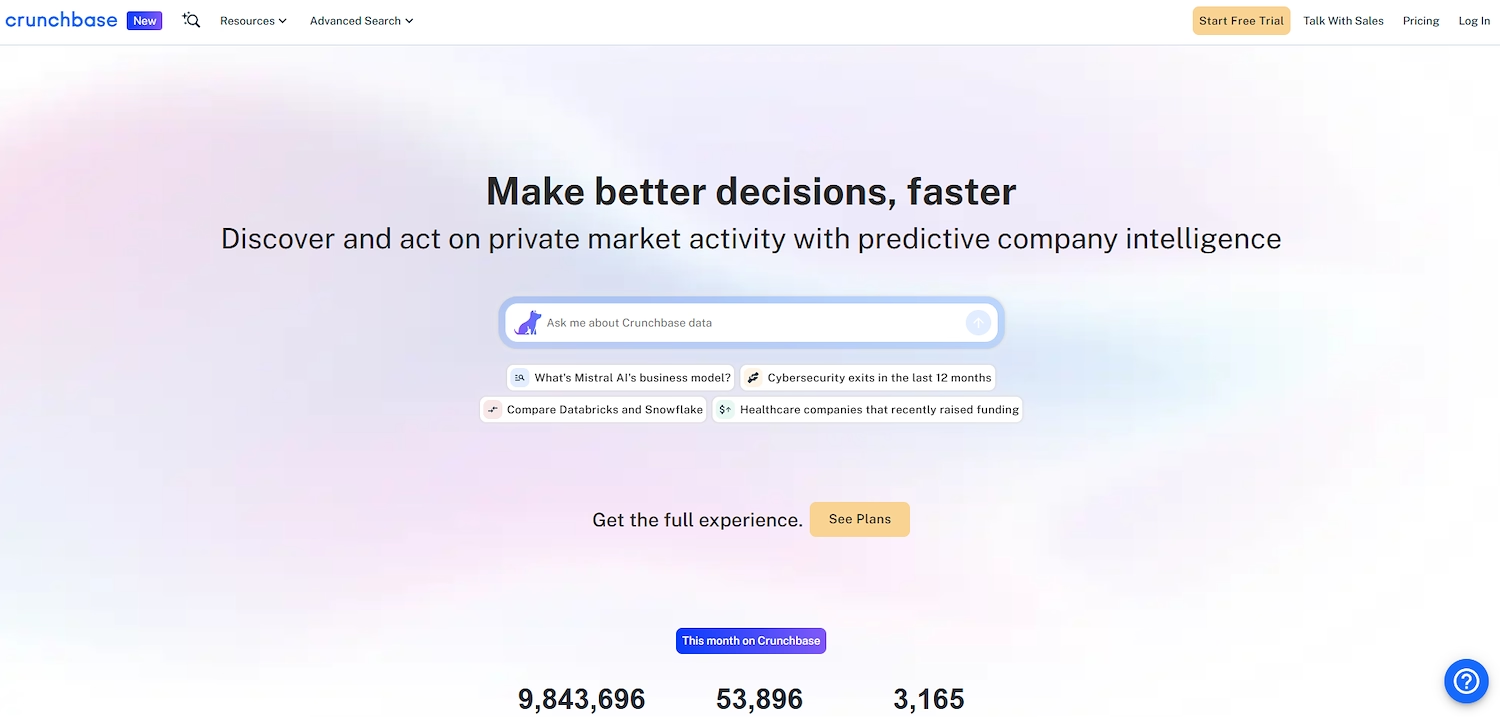
Crunchbase is a platform that provides business information on private and public companies. It tracks market trends, investment activity, and personnel moves. Sales teams use these signals to find prospects and identify timely outreach opportunities. The data helps users understand company growth and structure before engagement.
Crunchbase's Main Features
- Provides company, contact, and industry research data for market analysis.
- Builds lead lists using advanced search and data segmentation filters.
- Tracks private company data, including investment activity and market trends.
- Surfaces insights on market trends and potential startups using AI.
Crunchbase: How It Compares to Lonescale
Average Review Score: 4.5/5 stars based on 377 G2 reviews.
- Crunchbase provides detailed data on private company investments and funding rounds. This is different from Lonescale, which focuses on job change and hiring signals as its primary triggers.
- It uses AI to analyze market activity and identify emerging trends. This offers a broader market view compared to Lonescale's specific alerts for individual personnel moves.
- The platform includes advanced search and filtering options to build custom lead lists. This allows for proactive prospecting, while Lonescale delivers reactive alerts based on job changes.
- This tool offers industry research data for broad market analysis. This helps teams understand an entire sector, unlike Lonescale, which provides signals about specific companies and people.
Where Lonescale Has An Edge Over Crunchbase
- Crunchbase offers broad market data, including funding and investments. This approach might create noise for users who only need the specific job-change alerts that Lonescale provides.
- The platform is designed for proactive research into companies and markets. In comparison, Lonescale delivers automated alerts for job changes, which suits teams that prefer a reactive notification system.
- Some users note that because Crunchbase covers so much company data, information can sometimes be out of date. Lonescale's narrow focus on recent job movements may offer more timely data for that specific purpose.
Pricing and Cost-Effectiveness
Crunchbase offers transparent pricing, with its Pro plan starting at $588 per user annually. In contrast, Lonescale uses a custom model, which may be more cost-effective for teams that only need its specific job-change intelligence. For detailed pricing, visit Crunchbase's official website.
Which One Should You Go With?
Choosing a Lonescale alternative depends on many variables, including your team's specific needs and budget. This guide analyzed several options to help you find the right fit for your sales operations.
For teams exploring digital workers, 11x offers AI agents that manage specific sales functions. These agents handle tasks like prospecting, outreach, and lead qualification, which can augment your current sales process and support your team's operations.




